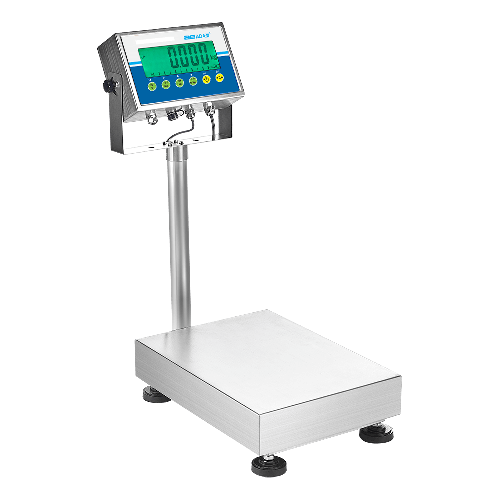
Scales and balances are used almost everywhere, sometimes in less than perfect conditions or in demanding settings. Some scales are built to withstand harsh industrial or wet environments, like washdown scales. Digital washdown scales, as their name indicates, are desinged to be easily washed or cleaned down after use, therefore they have to prevent liquids and particles from entering the internal components of the scale. Frequent washing or cleaning of the scale is required in applications during which the scale is splashed or has residue from weighing previous samples. They’re used in various industries, and there are a few different types we’ll explore in this guide.
What does it mean for a scale to be “washdown”?
You might think using the term “washdown” instead of waterproof is an odd choice. That’s because not all washdown scales have the same protection. Ingress Protection, or IP ratings, indicate how much resistance to elements like water and dust and what kind of cleaning they can handle. Some scales can resist spills or humid environments while others can be washed with a pressure hose. When purchasing a washdown scale, make sure to pay attention to the IP rating and language used in the description to get the scale most adapted to your needs. Even if a scale is made of stainless steel, it might not be water or dust resistant (because the load cells aren’t sealed), so look for the IP rating, the term washdown and a description of the cleaning it can handle
To learn more about IP ratings including what they mean and the levels of protection they offer, please see our blog post on understanding IP ratings.
Types of washdown scales
Washdown scales come in a range of shapes and sizes since this simply means that they are designed to withstand being washed down after use. For example, most stainless steel scales are classified as washdown since they are constructed from water-resistant materials. We have included a brief list of some of the most common types of scales you are likely to see that have been built with water-resistance in mind:
Bench scales
Bench washdown scales tend to be medium to small-sized, perfect for limited space and reduced loads. These scales aren’t meant for particularly heavy or big loads, but are exceptionally useful in warehouses, laboratories and commercial environments for weighing smaller items including food, lubricants and chemicals. Our own Aqua Washdown Scales are IP67 rated, which means their load cells are protected from dust and that the scale can withstand high-pressure jets from all directions. It can also checkweigh and has overload protection.

Floor scales
Floor washdown scales are durable and can handle bigger, heavier loads. Adam scales are also packed with more features. Our Gladiator series is IP67 rated, can checkweigh, count parts, perform dynamic and percentage weighing, and more. Floor scales are great because they’re very versatile, allowing you to use a single scale to perform multiple functions. The Gladiator series has optional relay triggers, so you can connect the scale to other devices to make large weighing tasks easier. These scales are often used in food processing areas, commercial warehouses and dockyards for weighing items in bulk.

Platform scales
Stainless steel platforms like our PT offer a large capacity and are well-suited for weighing bulk quantities in docks or food processing facilities. They're built to withstand demanding conditions in harsh environments with sealed components that are protected from water and dust ingress. Do keep in mind that if you need a scale to be washdown, the indicator and the platform must both be washdown, preferably with the same IP rating. Stainless steel platforms can be paired with the AE 403 indicator, which is rated IP67.
Retail scales
Retail washdown scales are compact and legal for trade. They offer all the usual functions of approved scales, such as a display that shows weight, price per unit and total cost, a rear-mounted display that customers can see, and portability for convenience.
.png)
Which industries use washdown scales?
Being dustproof and waterproof (or at least resistant to spills and humidity) is helpful in many industries, as it increases the scale’s longevity even when used in tough conditions, and ensures that its precision isn’t compromised by demanding settings. The food industry has very high hygienic standards, and as such requires frequent, thorough cleanings. Retail stores that sell food also use washdown scales to clean between customers or to avoid cross contamination. Factories, warehouses and construction sites with a lot of dust and other particles also use washdown scales to ensure speedy cleaning and reliable operation despite the conditions. The medical and pharmaceutical industries also use washdown scales to maintain a clean or sterile room’s condition, avoid contamination and weigh messy samples, chemicals or powders.
Why we recommend using a washdown or waterproof scale
Using a washdown scale not only ensures the weighing equipment stays clean, but speeds up cleaning, keeps the scale reliable, prevents dirt build up, cross contamination and the growth of mold or bacteria. Your scale’s IP rating is key to knowing exactly how protected it is from water and dust, as well as the extent of cleaning it can withstand. If you’re not sure, ask your vendor or check the manufacturer’s manual. Some scales are only meant to resist small spills and minimal dust while others can be cleaned with pressure hoses. All Adam Equipment washdown scales are rated IP66, which means they can be thoroughly hosed down or cleaned with a pressure washer. Review the hygienic guidelines and the settings where the scale will be used to ensure the conditions will not impair your scale’s operation.

